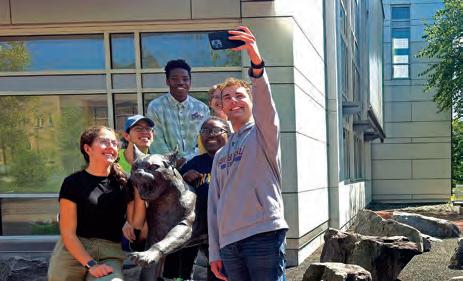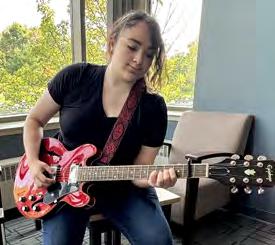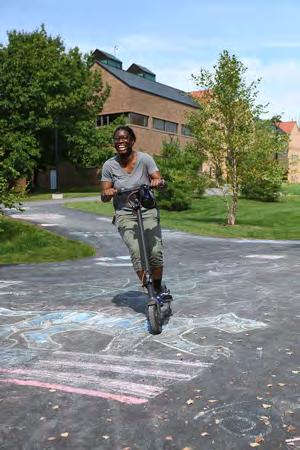






SUNY Polytechnic Institute, New York’s premier public polytechnic, provides an innovative and affordable higher education for students interested in science, engineering, technology, business, healthcare, and other liberal arts offerings for a well-rounded approach to experiential learning. Our commitment to a hands-on education situates students with both the academic structure customary of undergraduate study and unique opportunities for training and cutting-edge research, ultimately providing learners an unmatched education targeted for success in our fast-changing world. SUNY Poly students enjoy public school tuition with benefits that many small, private institutions boast, including small class sizes, individualized learning experiences, and a tight-knit community.







As one of the oldest engineering disciplines, civil engineering is recognized for its crucial role in shaping our world. Civil engineers design, construct, and maintain the infrastructure that supports our daily lives, from transportation systems to water supply networks. The field is continually evolving as civil engineers - key contributors to the technological enrichment of the future - pursue innovations that improve the lives of others.
SUNY Poly’s civil engineering program encompasses multiple specialties. The courses provide the foundation for breadth across the discipline, a balance between theory and application, and opportunities for hands-on learning. Civil engineering students choose their area of concentration from one of the following:
• Structural/geotechnical engineering
• Transportation engineering
• Environmental/water resource engineering
Students in the program are challenged to adapt to changes in technology and remain at the leading edge of innovation as they pursue:
• A solid foundation in mathematics, physical sciences, liberal arts, and the fundamentals of engineering design.
• The technical knowledge and critical thinking skills required for the professional practice of civil engineering and for seeking advanced degrees.
• The development of communications skills, teamwork, lifelong learning and understanding of professional ethics and social responsibility in a global context.
The civil engineering programs at SUNY Poly are accredited by the Engineering Accreditation Commission of ABET. www.abet.org Why does this matter? ABET accreditation:
• Verifies your degree meets global standards of civil engineering
• Enhances employment opportunities - in the United States and internationally
• Qualifies you to sit for professional licensure
• Increases your eligibility for scholarships
The need for civil engineers is expanding! Employment is expected to grow by 6% by 2033.
Our program offers three key concentrations, each crucial for shaping safe, efficient, and sustainable infrastructure. These areas enhance technical expertise and provide specialized skills valued in the job market. Our unique approach to concentration coursework emphasizes hands-on learning and real-world applications, fostering collaboration with industry professionals.
• Structural/Geotechnical: focuses on designing structures with steel and concrete, foundation design, and prepares students for advanced structural and geotechnical work
• Transportation: focuses on transportation operations, facility operations, and the design of transportation networks (roads, railroads, airports, ports)
• Environmental/Water Resource: focuses on water and waste water system design, solid and hazardous waste, and storm water engineering
Students have access to several laboratories with industrystandard computer applications. Laboratories are PC-based networks running applications in AutoCAD, Microstation, RAM Structural System, InRoads, Microsoft Project, gINT, Driven, and GeoSlope. In addition to computer labs, students perform hands on soils and materials (aggregate, cement, bitumen, concrete, steel) testing.
Center for Smart Infrastructure and Sustainability (CSIS)
Recognized for its interdisciplinary collaboration and cuttingedge technologies, CSIS is dedicated to advancing research, technology, education, and policies that promote intelligent and sustainable infrastructure development. Currently, CSIS is working on projects in the following research focus areas: renewable energy, sustainable material, resilient infrastructure, smart transportation, green buildings, water management, and Internet of Things (IoT) for infrastructures.
Directed by Dr. Zhanjie Li, professor of civil engineering, CSIS is a hub for students to engage in cross-disciplinary, hands-on learning.
A degree in civil engineering allows graduates the ability to select a career in a variety of settings. Graduates may pursue rolls in planning, design, construction, management, inspection, technical services, or sales. Employers often include engineering design firms, design/build construction firms, and local, state and federal government agencies. Graduates can become professionally licensed in New York State in their specific area of expertise or pursue an advanced degree.
Calculus I & II
Differential Equations
Biology
Chemistry
Physics I & II
Computer Fundamentals
Intro to Engineering
Design Tools and Processes
Engineering Mechanics: Statics
Mechanics of Materials
Civil Engineering Materials
Professionalism
Elementary Surveying
Structural Engineering
Transportation Engineering
Environmental Engineering
Geotechnic Engineering
Fluid Mechanics
Junior Civil Lab
Engineering Science
Capstone Design
Structural/Geotechnical Concentration
Structural Steel Design
Reinforced Concrete Design
Finite Element Analysis
Foundations Engineering and Design
Slope Stability and Retaining
Wall Design
Transportation Concentration
Traffic Engineering
Highway Design
Transportation Terminal Design
Transport Network Analysis
Environmental/Water Resource
Concentration
Hydrology & Storm Water Management
Hazardous & Solid Waste Treatment
Water & Waste Water Unit Design
Groundwater Hydrology
Upper CE Electives
Construction Management
Sustainable Development
Sustainable Energy
Green Building Strategies: LEED lab
Wind turbine analysis and design
Graduates of the civil engineering program have the opportunity to pursue diverse, well-paying careers, and our alumni say they gained many valuable skills through their academic preparation at SUNY Poly. Find more information about alumni employers and alumni job titles online.

Located in Utica, NY, on hundreds of wooded and landscaped acres, SUNY Poly’s campus is a beautiful living and learning environment. Students live in our modern, spacious residential complexes, including the new Hilltop Hall, SUNY’s first zero-net carbon residence hall, and enjoy an expanding array of student-focused facilities that include our state-of-the-art Center for Global Advanced Manufacturing, Student Center, and Wildcat Field House. Life on campus is enriched by a wide variety of events and activities, including the Wildcats’ championship-winning intercollegiate athletics program, our Wildcat Esports team, and a weekly agenda of intramurals, concerts, comedians, and more. Students can join one of the dozens of clubs and organizations or start one with a group of friends who share an interest.

